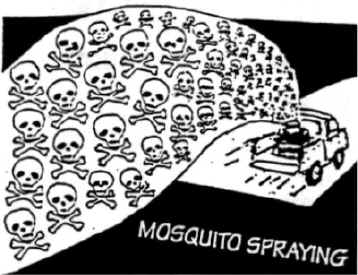 |
No Spray News James Irwin |
 |
No Spray News James Irwin |
May 21, 2002 Page 4
The Facts on West Nile Virus
Even during an outbreak...
- Most mosquitoes are not infected with West Nile Virus.
- Most mosquito bites will not lead to a West Nile Virus infection.
- If past outbreaks in the U.S. are any guide, West Nile Virus in the Northeast U.S. is most likely to bridge into the human. population in August and September.
- Most people who become infected do not get sick.
- About 30% of people infected in 1999 reported minor "flu-like" symptoms.
- In U.S. outbreaks, fewer than I% of infected people became seriously ill, with central nervous system infection (encephalitis &/or meningitis).
- Older people and the immuno-compromised are at greater risk of becoming seriously ill from West Nile Virus.
- Children are not in a higher risk group.
- Of 62 hospitalized in 1999 with West Nile Virus, 7 died. In 2000, of 20 hospitalized with West Nile Virus, 2 died. One person has died thus far in 2001.
It's a One-Time Deal
Infection with West Nile virus, even the usual inapparent infection that one is not even aware of, is believed to provide lifetime immunity to the disease. There is already a WNV vaccine for horses, and human trials of a vaccine for people are expected to begin later this year.
A Disease of Birds
West Nile virus is a bird disease which people accidentally get. It is almost always fatal to crows, and for this reason dead crows are considered a good early indicator for the presence of this disease. Lois Levitan of Cornell reports that: "WNV-positive birds are almost always detected in an area well before the disease presents a risk to the local human population."
While crows serve as sentinels for WNV, they are not important reservoirs for the virus, since they die so quickly. English sparrows (which are actually weaver finches) appear to provide an important reservoir for WNV, since in tests these birds developed the highest levels of the virus, and held this level for the longest period (up to 5 days). Obviously migratory birds are also involved, since West Nile virus has already reached Florida.